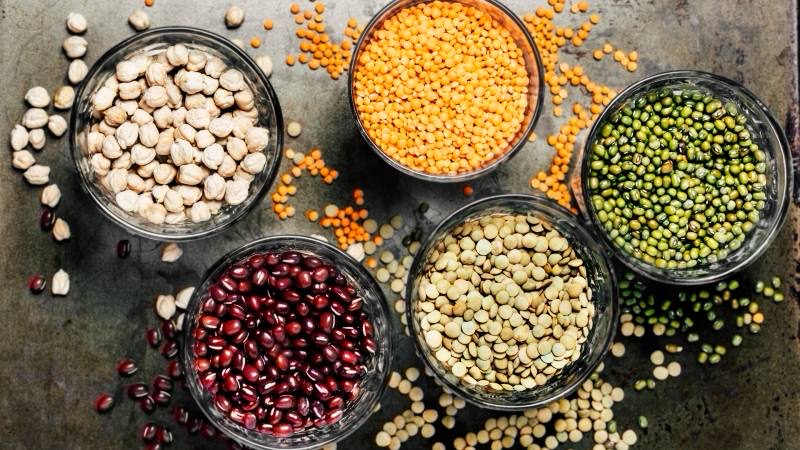
Beans are a powerhouse when it comes to heart health. Legumes like lentils, chickpeas, beans, and split peas are packed with fiber, antioxidants, and essential nutrients. Recent research shows that eating more beans may help reduce cholesterol, potentially replacing the need for cholesterol-lowering statin drugs. In this article, we will explore the heart-healthy benefits of beans, their role in cholesterol management, and how they can help prevent and treat heart disease.
The Heart Health Benefits of Beans
Beans are an excellent source of plant-based protein, which is low in saturated fat and cholesterol. The soluble fiber in beans binds to cholesterol in the digestive system, helping to remove it from the body. This process can lower LDL cholesterol (the “bad” cholesterol), which is a key contributor to heart disease. By including more beans in your diet, you can significantly reduce the risk of developing heart disease over time.
Furthermore, beans are a rich source of potassium, magnesium, and folate, all of which contribute to overall heart health. These nutrients help lower blood pressure, support healthy blood flow, and reduce inflammation in the body. As a result, beans are not just a great food choice for lowering cholesterol, but they also play a role in preventing other cardiovascular conditions.
How Beans Help Lower Cholesterol and Reduce Heart Disease Risk
When it comes to lowering cholesterol, beans have proven benefits. The fiber in beans, particularly soluble fiber, helps reduce the absorption of cholesterol from food. As the body digests beans, they form a gel-like substance that binds to cholesterol molecules and carries them out of the body through digestion.
Incorporating beans into your diet regularly can help significantly lower your cholesterol levels. Studies show that adding a cup of beans to your daily diet can reduce LDL cholesterol by up to 10%. This effect may be enough for some individuals to reduce or even eliminate their need for cholesterol-lowering medications.
The Role of Beans in Diabetes Prevention and Blood Sugar Control
Beans are also beneficial for managing blood sugar levels, which is especially important for those at risk of diabetes or currently managing type 2 diabetes. Unlike simple carbohydrates, beans are digested slowly due to their high fiber content. This slow digestion helps prevent blood sugar spikes and ensures stable energy levels throughout the day.
Beans also contribute to what’s known as the second-meal effect. By consuming beans at one meal, you can stabilize blood sugar levels for the following meal. This effect helps prevent insulin spikes and supports better overall blood sugar control, making beans an essential food for managing prediabetes and diabetes.
Why Beans May Be Better Than Statin Drugs for Cholesterol
Many people rely on statin drugs to control their cholesterol levels. However, studies show that dietary changes, including adding more fiber and plant-based foods like beans, can be just as effective—and possibly safer—than statins in lowering cholesterol.
Green leafy vegetables, whole grains, and legumes such as beans have been shown to improve cholesterol levels and reduce cardiovascular risk factors without the side effects that often accompany medications like statins. Beans also provide a natural source of antioxidants, which help reduce inflammation in the body—a significant contributor to heart disease.
Are There Any Drawbacks to Beans? Addressing the “Anti-Nutrient” Phytates
Beans contain phytates, which are often called “anti-nutrients” because they can bind to certain minerals and reduce their absorption. However, the potential drawbacks of phytates are largely outweighed by their health benefits. Phytates have been found to provide several protective health benefits, such as cancer prevention, bone protection, and antioxidant support.
Moreover, research suggests that phytates may help prevent the formation of cancer cells, rehabilitate cancer cells, and contribute to bone health by preventing mineral loss. For most people, the benefits of eating beans far outweigh any potential negative effects associated with phytates. Their high fiber and antioxidant content make them a key component of a heart-healthy diet.

Delicious Ways to Add Beans to Your Diet
Including more beans in your meals is easy and delicious. Here are some creative ways to enjoy the heart-healthy benefits of beans:
1. Hummus
Hummus, made from chickpeas, is a popular dip that’s perfect for snacking. You can pair it with fresh vegetables like carrots, celery, or cucumbers. Try adding roasted garlic, herbs, or other spices to customize the flavor.
2. Beans in Salads
Adding beans to salads is an easy way to increase your fiber intake. Black beans, kidney beans, and chickpeas can be tossed into mixed greens, along with tomatoes, onions, and avocado for a fresh, nutrient-packed meal.
3. Soups and Stews
Beans make a hearty addition to soups and stews. You can add lentils to vegetable soup or white beans to a tomato-based stew. They provide protein and fiber, making your meals more filling and satisfying.
4. Bean Burgers
For a plant-based alternative to traditional meat burgers, try making bean-based patties using black beans or lentils. These burgers are not only delicious but also packed with nutrients.
Conclusion: The Heart-Healthy Power of Beans
Beans are a simple and effective way to improve your heart health. They lower cholesterol, regulate blood sugar, and support overall cardiovascular health. Adding beans to your diet can help prevent heart disease, reduce the need for statin drugs, and manage diabetes.
For optimal heart health, aim to include beans in your diet regularly. Whether you enjoy them in soups, salads, or as dips, beans are a versatile and nutrient-rich food that can easily be incorporated into any meal plan.
To learn more about how diet impacts heart health, check out the American Heart Association for additional resources on heart disease prevention: American Heart Association.




